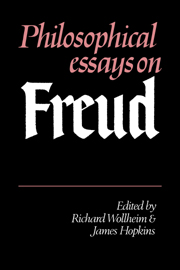Book contents
- Frontmatter
- Contents
- Introduction: philosophy and psychoanalysis
- 1 Conversations on Freud; excerpt from 1932–3 lectures
- 2 Freud, Kepler, and the clinical evidence
- 3 Critical empiricism criticized: the case of Freud
- 4 Freudian commonsense
- 5 Disposition and memory
- 6 On Freud's doctrine of emotions
- 7 The id and the thinking process
- 8 The bodily ego
- 9 Norms and the normal
- 10 On the generation and classification of defence mechanisms
- 11 Models of repression
- 12 Mauvaise foi and the unconscious
- 13 Self-deception and the ‘splitting of the ego’
- 14 Freud's anthropomorphism
- 15 Freud's anatomies of the self
- 16 Motivated irrationality, Freudian theory and cognitive dissonance
- 17 Paradoxes of irrationality
- Works of Freud cited
- Select bibliography
17 - Paradoxes of irrationality
Published online by Cambridge University Press: 01 October 2009
- Frontmatter
- Contents
- Introduction: philosophy and psychoanalysis
- 1 Conversations on Freud; excerpt from 1932–3 lectures
- 2 Freud, Kepler, and the clinical evidence
- 3 Critical empiricism criticized: the case of Freud
- 4 Freudian commonsense
- 5 Disposition and memory
- 6 On Freud's doctrine of emotions
- 7 The id and the thinking process
- 8 The bodily ego
- 9 Norms and the normal
- 10 On the generation and classification of defence mechanisms
- 11 Models of repression
- 12 Mauvaise foi and the unconscious
- 13 Self-deception and the ‘splitting of the ego’
- 14 Freud's anthropomorphism
- 15 Freud's anatomies of the self
- 16 Motivated irrationality, Freudian theory and cognitive dissonance
- 17 Paradoxes of irrationality
- Works of Freud cited
- Select bibliography
Summary
The idea of an irrational action, belief, intention, inference or emotion is paradoxical. For the irrational is not merely the nonrational, which lies outside the ambit of the rational; irrationality is a failure within the house of reason. When Hobbes says only man has ‘the privilege of absurdity’ he suggests that only a rational creature can be irrational. Irrationality is a mental process or state – a rational process or state – gone wrong. How can this be?
The paradox of irrationality is not as simple as the seeming paradox in the concept of an unsuccessful joke, or of a bad piece of art. The paradox of irrationality springs from what is involved in our most basic ways of describing, understanding, and explaining psychological states and events. Sophia is pleased that she can tie a bowline. Then her pleasure must be due to her belief that she can tie a bowline and her positive assessment of that accomplishment. Further, and doubtless more searching, explanations may be available, but they cannot displace this one, since this one flows from what it is to be pleased that something is the case. Or take Roger, who intends to pass an examination by memorizing the Koran. This intention must be explained by his desire to pass the examination and his belief that by memorizing the Koran he will enhance his chances of passing the examination.
- Type
- Chapter
- Information
- Philosophical Essays on Freud , pp. 289 - 305Publisher: Cambridge University PressPrint publication year: 1982
- 171
- Cited by



